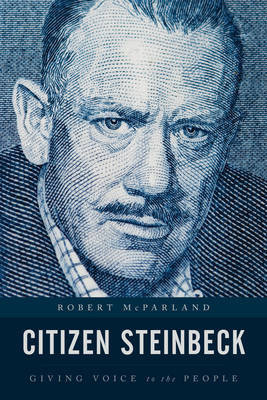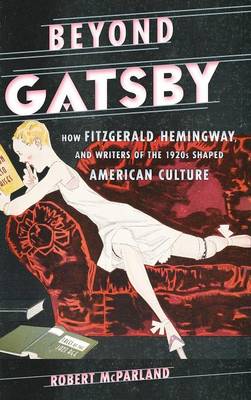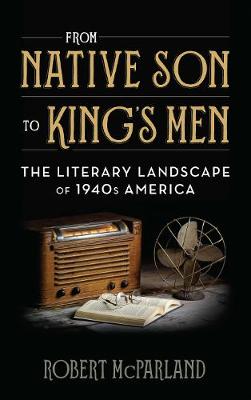Contemporary American Literature
3 total works
John Steinbeck is one of the most popular and important writers in American literature. Novels such as The Grapes of Wrath, Of Mice and Men, and East of Eden and the journal Travels with Charley convey the core of Steinbeck's work-fiction that is reflective and compassionate. The Nobel prize winner cared deeply about people, and his writing captured the spirit, determination, and willingness of individuals to fight for their rights and the rights of others. His art of caring is critical for today's readers and as a touchstone for our collective future.
In Citizen Steinbeck: Giving Voice to the People, Robert McParland explains how the author's work helps readers engage in moral reflection and develop empathy. McParland also looks at the ways educators around the world have used Steinbeck's writings-both fiction and nonfiction-to impart ideals of compassion and social justice. These ideals are weaved into all of Steinbeck's work, including his journalism and theatrical productions. Drawing on these texts-as well as interviews with secondary-level teachers-this book shows how Steinbeck's work prompts readers to think critically and contextually about our values.
Demonstrating the power a single author can have on generations of individuals around the world, Citizen Steinbeck enables readers to make sense of both the past and the present through the prism of this literary icon's inspirational work.
In Citizen Steinbeck: Giving Voice to the People, Robert McParland explains how the author's work helps readers engage in moral reflection and develop empathy. McParland also looks at the ways educators around the world have used Steinbeck's writings-both fiction and nonfiction-to impart ideals of compassion and social justice. These ideals are weaved into all of Steinbeck's work, including his journalism and theatrical productions. Drawing on these texts-as well as interviews with secondary-level teachers-this book shows how Steinbeck's work prompts readers to think critically and contextually about our values.
Demonstrating the power a single author can have on generations of individuals around the world, Citizen Steinbeck enables readers to make sense of both the past and the present through the prism of this literary icon's inspirational work.
Many of the heralded writers of the 20th century-including Ernest Hemingway, John Dos Passos, F. Scott Fitzgerald, and William Faulkner-first made their mark in the 1920s, while established authors like Willa Cather and Sinclair Lewis produced some of their most important works during this period. Classic novels such as The Sun Also Rises, The Great Gatsby, Elmer Gantry, and The Sound and the Fury not only mark prodigious advances in American fiction, they show us the wonder, the struggle, and the promise of the American dream.
In Beyond Gatsby: How Fitzgerald, Hemingway, and Writers of the 1920s Shaped American Culture, Robert McParland looks at the key contributions of this fertile period in literature. Rather than provide a compendium of details about major American writers, this book explores the culture that created F. Scott Fitzgerald and his literary contemporaries. The source material ranges from the minutes of reading circles and critical commentary in periodicals to the archives of writers' works-as well as the diaries, journals, and letters of common readers. This work reveals how the nation's fiction stimulated conversations of shared images and stories among a growing reading public.
Signifying a cultural shift in the aftermath of World War I, the collective works by these authors represent what many consider to be a golden age of American literature. By examining how these authors influenced the reading habits of a generation, Beyond Gatsby enables readers to gain a deeper comprehension of how literature shapes culture.
In Beyond Gatsby: How Fitzgerald, Hemingway, and Writers of the 1920s Shaped American Culture, Robert McParland looks at the key contributions of this fertile period in literature. Rather than provide a compendium of details about major American writers, this book explores the culture that created F. Scott Fitzgerald and his literary contemporaries. The source material ranges from the minutes of reading circles and critical commentary in periodicals to the archives of writers' works-as well as the diaries, journals, and letters of common readers. This work reveals how the nation's fiction stimulated conversations of shared images and stories among a growing reading public.
Signifying a cultural shift in the aftermath of World War I, the collective works by these authors represent what many consider to be a golden age of American literature. By examining how these authors influenced the reading habits of a generation, Beyond Gatsby enables readers to gain a deeper comprehension of how literature shapes culture.
On the heels of the Great Depression and staring into the abyss of a global war, American writers took fiction and literature in a new direction that addressed the chaos that the nation-and the world-was facing. These authors spoke to the human condition in traumatic times, and their works reflected the dreams, aspirations, values, and hopes of people living in the World War II era.
In From Native Son to King's Men: The Literary Landscape of 1940s America, Robert McParland examines notable works published throughout the decade. Among the authors covered are James Baldwin, Pearl S. Buck, James Gould Cozzens, William Faulkner, Ernest Hemingway, John Hersey, Norman Mailer, Ann Petry, Irwin Shaw, John Steinbeck, Robert Penn Warren, Eudora Welty, and Richard Wright. McParland explores how popular novels, literary fiction, and even short stories by these authors represented this pivotal period in American culture.
By examining the creative output of these authors, this book reveals how the literature of the 1940s not only offered a pathway for that era's readers but also provides a way of understanding the past and our own times. From Native Son to King's Men will appeal to anyone interested in the cultural climate of the 1940s and how this period was depicted in American literature.
In From Native Son to King's Men: The Literary Landscape of 1940s America, Robert McParland examines notable works published throughout the decade. Among the authors covered are James Baldwin, Pearl S. Buck, James Gould Cozzens, William Faulkner, Ernest Hemingway, John Hersey, Norman Mailer, Ann Petry, Irwin Shaw, John Steinbeck, Robert Penn Warren, Eudora Welty, and Richard Wright. McParland explores how popular novels, literary fiction, and even short stories by these authors represented this pivotal period in American culture.
By examining the creative output of these authors, this book reveals how the literature of the 1940s not only offered a pathway for that era's readers but also provides a way of understanding the past and our own times. From Native Son to King's Men will appeal to anyone interested in the cultural climate of the 1940s and how this period was depicted in American literature.


